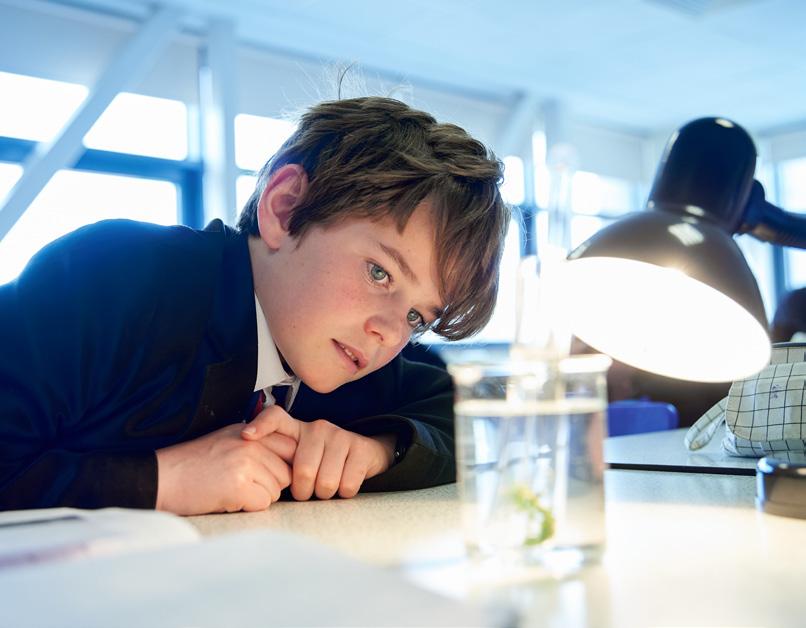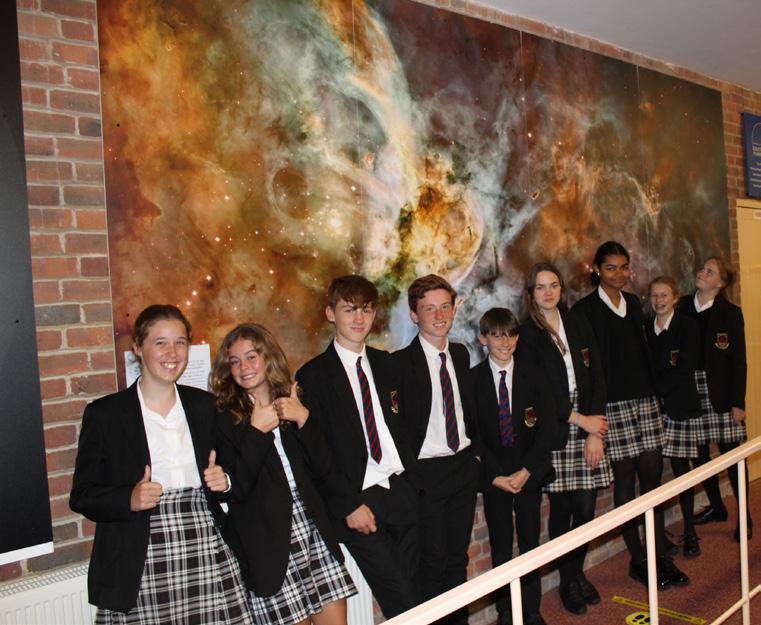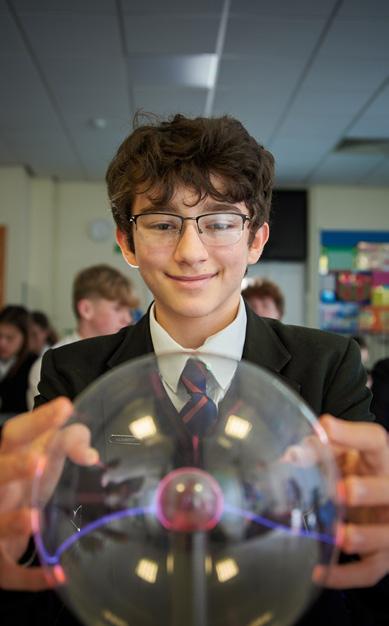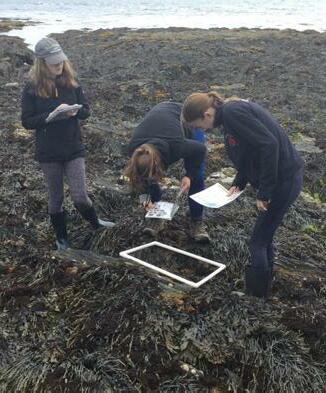
5 minute read
Science
Biology
Finally, a full three terms in school meant that our pupils conducted the full range of laboratory work and experiments! From investigations of brine shrimp behaviour with the First Years, to genetic modification of bacteria using fluorescent genes in the Upper Sixth, we have all thoroughly enjoyed getting back into the swing of proper Biology practical work after the disruption wrought by the lockdowns of the last two years.
The Sixth Form residential trip to Slapton Ley in South Devon was a highlight. In sunny weather over the May half term, they honed their sampling and statistics skills studying ecological energetics, biodiversity, and zonation. We also found time for mammal trapping, in which we secured a beautiful field mouse, and identification of native moths from the overnight light trap. A particular highlight was the evening bat walk, where we were lucky to see the emergence of a large number of horseshoe bats from a roost in the village. Another day for the Sixth Form at the beach in West Wittering, conducting their Required Practical on sand dune succession, gave a jolly end to a successful year.
Mandy Westwood
Chemistry
It has been great to get back to some normality this year, and to plan practical work in person again, although the pupils have proved to be very adaptable over the last two years. Our Upper Sixth students have needed to work particularly hard this year, as they were the year group who not only had their GCSE exams cancelled, but also missed the consolidation that goes with preparing for external exams. To their credit, they have overcome the difficulties caused by this, and achieved an outstanding set of results.
Although the Chemistry Olympiad competition is aimed at the most able Upper Sixth students, a significant number of Lower Sixth students asked to enter this year, following the trend started last year. In all, more than 20 students opted to take the exam, and they continued the success of the last few years. Our two Gold Certificate winners, Ellie Houghton and Emily Killing, were placed in the top 771 students in the country, while our seven Silver Certificate winners (including two Lower Sixth) were placed in the top 30%. A further 14 students, 11 of whom were Lower Sixth, were awarded a Bronze Certificate. Congratulations go to all of the students - these are significant achievements. Cosmetics Club continues to be very popular. Mr Chen and Mrs Dannatt were helped in running activities by Sixth Former Arwen Jones and Fifth Year Ben Dakin. They not only helped during the sessions, but also trialled new techniques and products. An extra burst of production in the Summer Term, led by former members of the Club, enabled them to have enough products to be able to stock a stand on Open Day, as well as offer visitors the chance to make their own bath bombs.
Chemsoc has continued to thrive under the guidance of Mr Chen on a Wednesday lunchtime, intended to provide the Sixth Form with a forum to investigate, present, and discuss chemistry ideas beyond the scope of the A-Level course. Students presented and discussed topics ranging from the chemistry of poisons, to the chemistry of painkillers, and the structure of glass. Tom Bowling did an excellent job as chairperson, helping to organise the sessions and widening the membership. The enthusiasm of the students was delightful to see.
In the Spring Term, the Second Year Academy group learnt about gunpowder and other explosives. Pupils were able to investigate aspects of explosives such as the role of


oxidising agents, the difference between substances burning and exploding, and the difference in power output when the same fuel burns or detonates. Sadly, they were not able to make their own fireworks for obvious safety reasons! Despite this, the sessions were a very popular part of the Academy programme and we look forward to running them again.
David Dunster
Physics
It was a welcome return to the classroom for the Physics Department this year, bringing an end to the fun of practical experiments in students’ kitchens!
While our in-school studies have returned to normality, it has been outside the classroom that we have found some of the highlights of the year. In the SATRO challenge, our team were regional heat winners, and indeed were awarded the highest regional heat score across the UK, ending up with a very respectable fifth place in the final. The challenge had involved the construction of a device to roll a marble down a ramp in exactly 10 seconds. The British Physics Olympiad is an annual test of the calibre of the Churcher’s Physics students. And again, this year we can be proud, with 10 bronze awards placing those students in the top third in the country, and six students achieving Silver (top 16%). Congratulations to our departing Physicists Isabelle Whittle, George Feeney, James Medley, Oliver Fogelin, James Hill, and Emily Killing. No academic year in the Physics Department feels complete without the rite of passage that is a visit to the Planetarium. We had two occasions to be wowed by the majesty of the Solar System as both First and Third Years took advantage of the end of restrictions.
Our Physics Society lectures (FizzSoc) continued on a Monday lunchtime, and comprised of a series of student and teacher led lectures, covering a range of different topics from colour centres to the Apollo Space missions. Our own OC, Harry Payne, returned to share his PhD studies in materials science at Imperial. In total, we held some 20 lectures this year.
A new venture for the department has been the launch of the Schrödinger Projects for the Fifth Form. This is a six-week programme to help inspire, encourage, and develop skills for independent science projects, which will provide a foundation to build upon in the Sixth Form. At the core of the programme was a five-week project chosen by the students, for example, investigating the underlying physics behind earthquake resistant buildings or bike suspension. There were also opportunities to attend talks and take part in other enrichment activities to support and extend the GCSE Physics curriculum. We were delighted that almost 30 students chose to participate in this extracurricular club, culminating in a presentation evening for their fellow students, teachers, and parents.
Matthew Kelly











